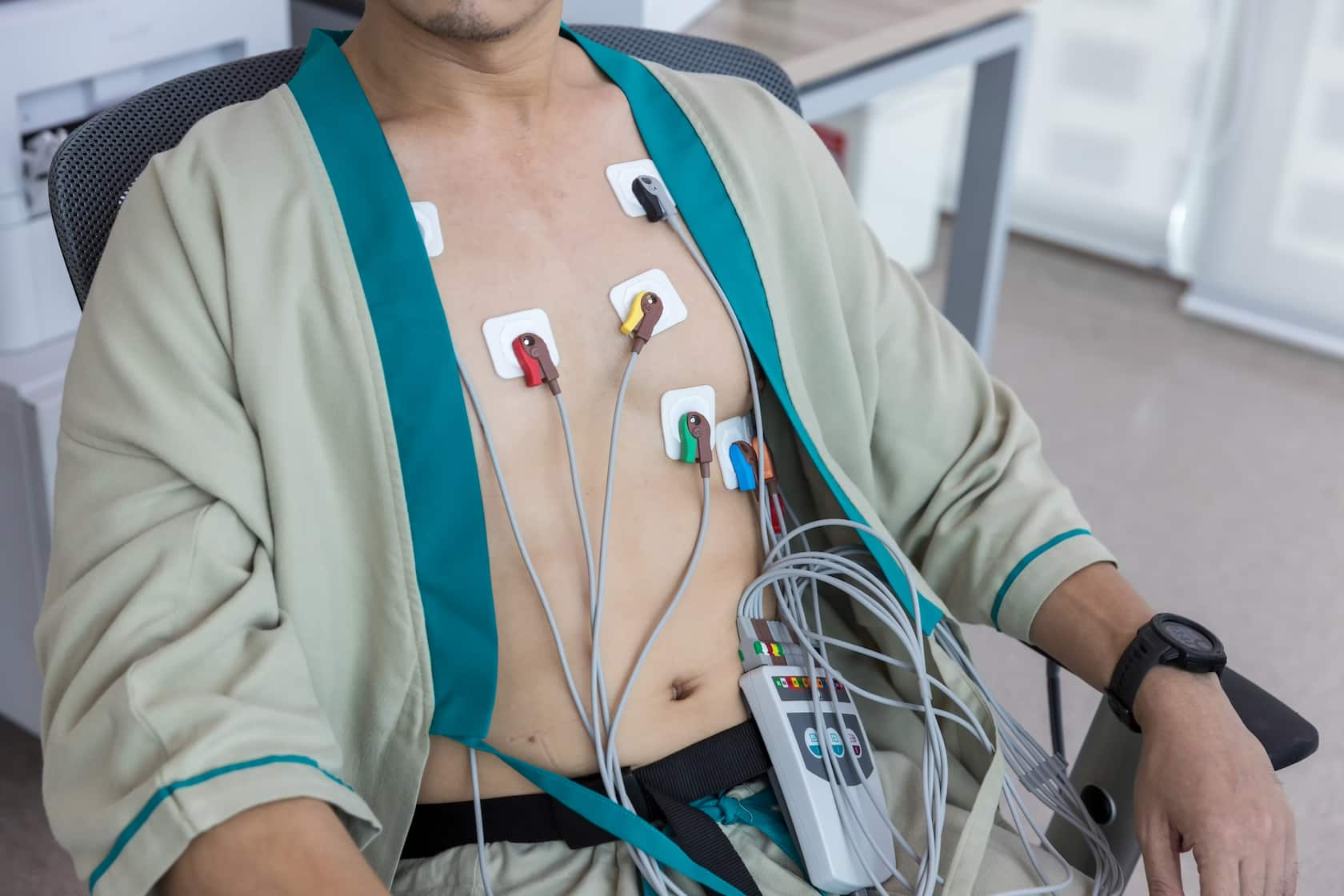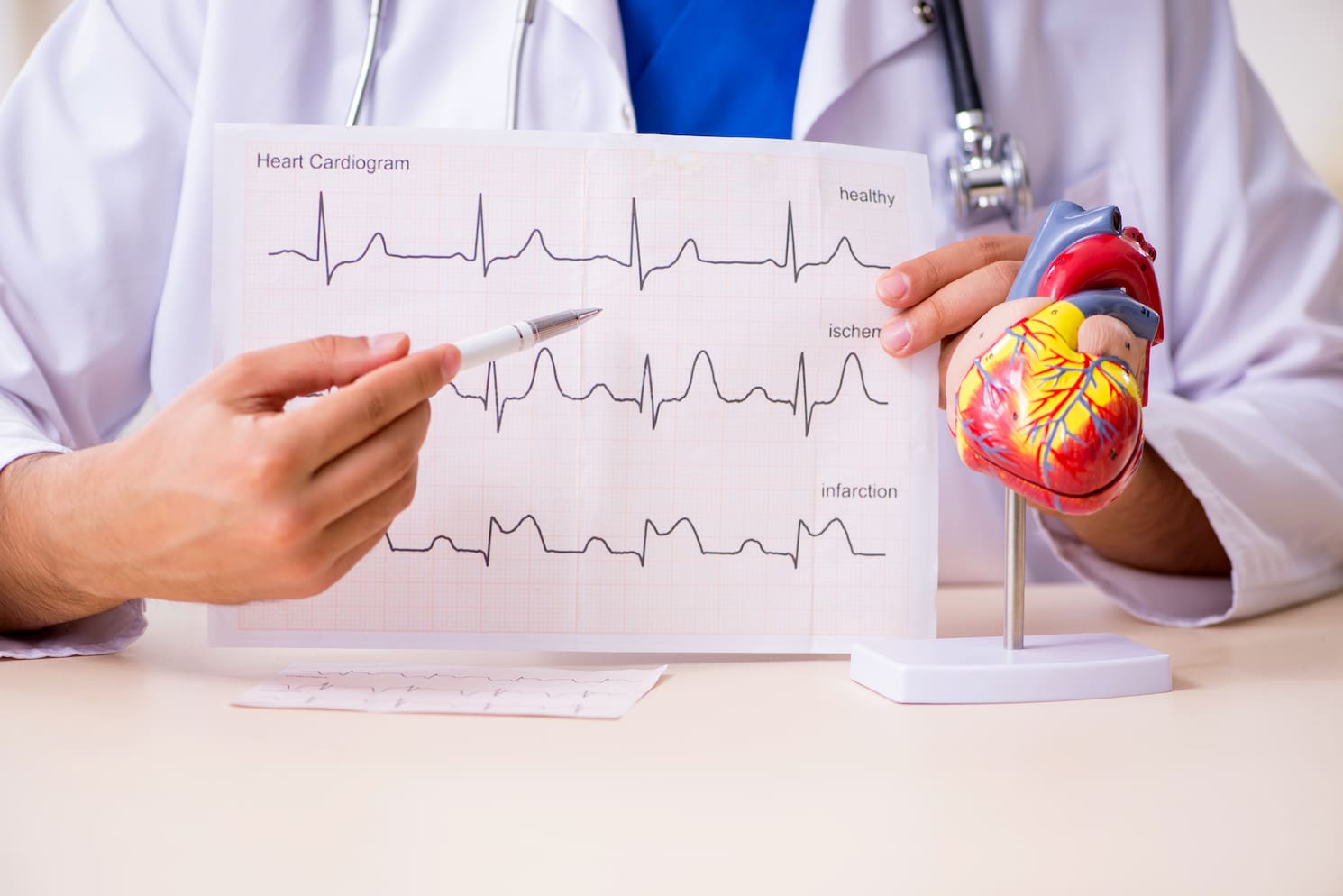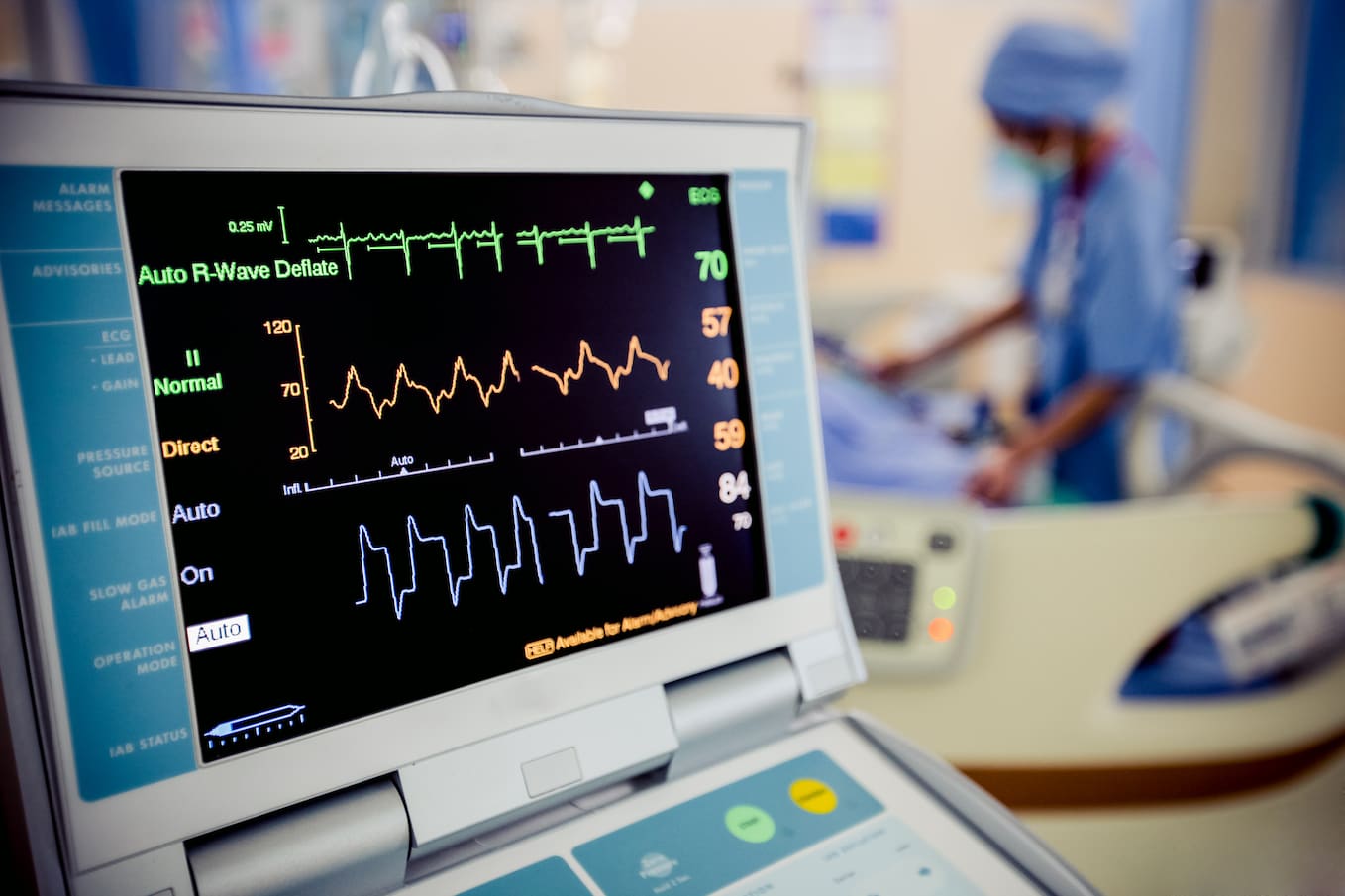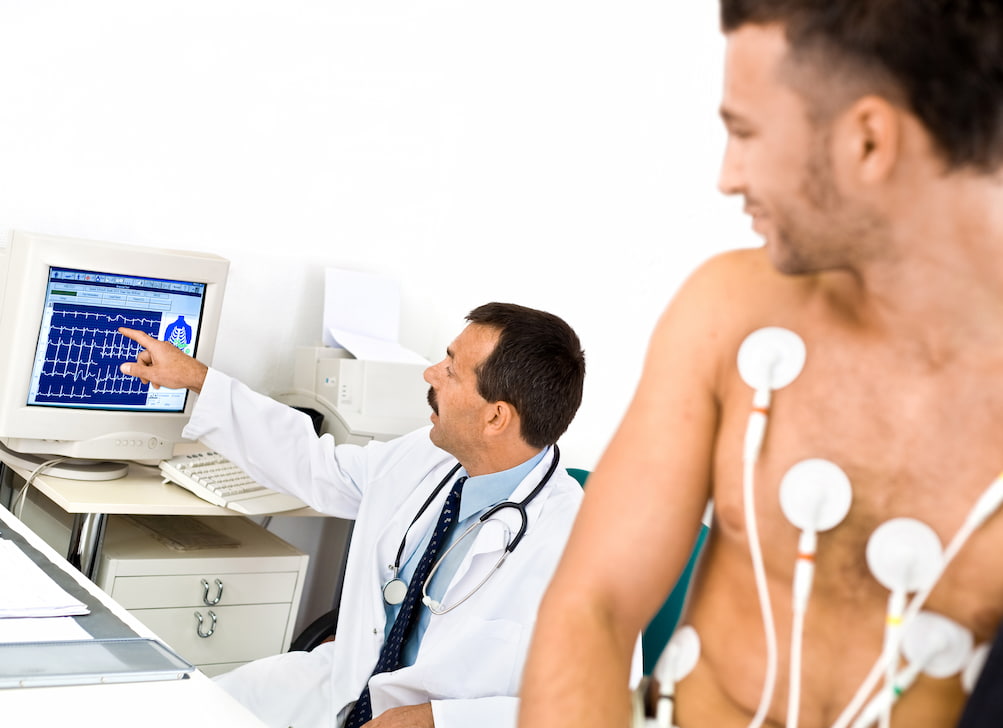Electrocardiogram in Turkey
Healthy Türkiye helps you find the best electrocardiogram in Turkey at affordable prices and adopts a 360-degree service approach in all areas of health through affiliated hospitals.
- Medical Treatment
- Medical Check-Ups in Turkey
- Colonoscopy in Turkey
- Vision Checkup in Turkey
- Electrocardiogram in Turkey
- General Check-Up in Turkey
- Hearing Screening Test in Turkey
- Allergy Skin Test in Turkey
- Gynecological Exam in Turkey
- Prostate Cancer Screening in Turkey
- Skin Cancer Screening in Turkey
- Stress Test in Turkey
- Bone Density Test in Turkey
- Diabetes Risk Test in Turkey
- Executive Check-Up in Turkey
- Gastroscopy in Turkey
- Sleep Lab in Turkey
- Homepage
- Medical Treatment
- Electrocardiogram in Turkey

About Electrocardiogram (EKG) in Turkey
In Turkey, the ECG(EKG) also known as electrocardiogram is a medical test that detects cardiac abnormalities by measuring the electrical activity generated by the heart as it contracts. The machine that measures and records the patient’s ECG is called an electrocardiograph. The electrocardiograph records the electrical activity of the heart muscle and displays this data as a trace on a digital screen or on paper. Then, this data is interpreted by a medical practitioner.
ECGs from healthy hearts have characteristic shapes and views. Any irregularity in the heart rhythm or damage to the heart muscle might change the electrical activity of the heart so that the shape of the EKG is changed. The doctor can recommend an ECG for people who may be at risk of heart disease because there is a family history of heart disease, or because they smoke, are overweight, or have diabetes, high cholesterol, or high blood pressure.
Doctors can also recommend the ECG if a person is experiencing symptoms such as chest pain, shortness of breath, dizziness, fainting, or irregular heartbeats (palpitations). Electrocardiograms are usually performed to monitor the health of people who have been diagnosed with heart problems, to help assess artificial cardiac pacemakers, or to monitor the effects of certain medications on the heart.
An ECG measures the time intervals and helps the doctors define how long the electrical wave takes to pass through the heart. The amount of time it takes for a wave to travel from one part of the heart to another provides the doctors with information on whether the electrical activity is slow or normal, irregular or fast. Besides, by measuring the amount of electrical activity which passes through the heart’s muscle, the doctor is able to evaluate if parts of the heart are being overworked or too large.

ECG in Turkey
In Turkey, an EKG is an electrocardiogram, which is a scan that is designed to detect and record the electrical activity of your heart. This is accomplished via electrodes placed strategically at several spots on your limbs and chest. The primary purpose of the electrocardiogram is to measure the rate at which your heart is beating. It test also determines whether the heart muscle is performing at a healthy rhythm, and whether or not the beats are irregular or steady. Actually, the electrical pulses transported through the heart are measured for their strength and timing.
ECG in Turkey is a simple procedure that is painless, and it is often included as part of a patient’s regular checkup. The doctors might also get an EKG prior to surgery. The EKG may be used continuously during some procedures and surgeries. Patients who are in the hospital with certain conditions might also need continuous ECG monitoring.
Sometimes, in an attempt to diagnose heart rhythm problems, portable electrocardiogram monitors can need to be worn for 24 hours or more to give an extended picture of the heart’s rhythm. But, the electrocardiogram shows only the condition and function of the heart at the exact time that the reading is recorded, it cannot always predict what will happen to the heart in the future.
An ECG recording machine will generally show your heart rhythm and electrical activity as a graph displayed electronically or printed on paper. For an ambulatory ECG, the electrocardiograph will store the information about your heart electronically, which may be accessed by a doctor when the test is complete.

We Care About Your Health
Healthy Türkiye provides the best for your health and comfort. You will feel privileged with us.
7/24 Quality Personal Assistance Throughout Your Journey
Customizable for You All-Inclusive Packages
Get the Right Advice for your Health
Electrocardiogram Results in Turkey
A normal healthy heart has a regular characteristic pattern, but any abnormality or damage to the heart will show up differently from the normal heart pattern in the electrocardiogram. Letters of the alphabet (P, R, Q, S, T) identify the different spikes of the printout, and then these are read by the doctor to indicate problem areas in the heart. The reading of an ECG is quite complex and can take time; doctors receive special training in this area. Some ECG machines have software that helps with the interpretation of the test.
An electrocardiogram measures the heart’s electrical activity through electrodes, and a computer translates the heart’s activity into a printed or onscreen readout for doctors in Turkey. The electrical activity image generally looks like a line graph with peaks and valleys. An electrocardiogram shows three “waves” of signals. The “P” wave represents the electrical impulse in the upper chambers of the heart. The “QRS” wave shows electrical activity in the lower chambers. The “T” wave symbolizes the heart’s return to rest.
The shape and size of the waves, the time between each wave, and the rate and regularity of beating provide valuable information to your doctor. Additionally, to provide insight into the heart’s rhythm, the EKG helps doctors determine the size of the heart chambers, detect heart muscle damage and identify abnormal levels of certain electrolytes, such as potassium and calcium, in the blood.
The paper used to record electrocardiograms is standardized across most hospitals in Turkey. Each small square symbolizes 0.04 seconds. Each large square symbolizes 0.2 seconds. 5 large squares are 1 second and 300 large squares are 1 minute in ECG results. Each individual lead’s electrocardiogram recording is slightly different in shape. This is because each lead is recording the electrical activity of the heart from a different direction.
When the electrical activity within the heart travels towards a lead you get a positive deflection in EKG. And when the electrical activity within the heart travels away from a lead you get a negative deflection. But in reality, electrical activity in the heart flows in many directions simultaneously. Each deflection or wave on the ECG represents the average direction of electrical travel.
The height of the deflection symbolizes the amount of electrical activity flowing in that direction. So, the higher the deflection, the greater the amount of electrical activity flowing toward the lead. The lead with the most positive deflection is most aligned with the direction in which the heart’s electrical activity is traveling.
Why the Electrocardiogram is Performed?
Electrocardiogram results can give the doctors details about the following:
Heart rate: Generally, heart rate might be measured by checking the pulse. An ECG can be helpful if your pulse is difficult to feel or too fast or too irregular to count accurately. So, an ECG might help identify an unusually fast heart rate (tachycardia) or an unusually slow heart rate (bradycardia).
Heart rhythm: An EKG may detect irregular heartbeats (arrhythmias). An arrhythmia can happen when any part of the heart’s electrical system doesn’t work properly.
Heart attack: An ECG may show evidence of a previous heart attack or one that’s currently happening. The patterns on the ECG might help determine which part of the heart has been damaged, as well as the extent of the damage.
Blood and oxygen supply to the heart: An ECG done while you’re having signs might help your healthcare provider determine chest pain is because of whether reduced blood flow to the heart muscle
Heart structure changes: An EKG may provide clues about an enlarged heart, heart defects, and other heart problems.
If results show a heart rhythm problem, you might need another electrocardiogram or other imaging test, such as an echocardiogram. Treatment depends on what’s causing your symptoms.
An EKG is usually the primary test done to determine whether a person has heart disease. The doctors might order this test:
If you have chest pain or palpitations
If you are scheduled for surgery
If you have had heart problems in the past
If you have a strong history of heart disease in the family
Healthy Türkiye offers rapid access to an electrocardiogram test if you have symptoms that may suggest you have a heart problem. In Turkey, Healthy Türkiye hospitals offer the three main types of ECG to help identify a heart problem. We use the latest modern technology that is operated and reviewed by highly skilled and experienced staff. We also offer electrocardiograms as part of your private health check-up, without any suspicion of heart disease, for peace of mind.
How are Electrocardiograms (Wave Strips) Used to Evaluate Heart Function?
At ECG in Turkey, electrode leads on the chest wall are able to detect electrical impulses that are generated by the heart. Multiple leads occur in many electrical views of the heart. By interpreting the tracing, the physician can learn about the heart rate and rhythm as well as blood flow.
The rate refers to how fast the heart beats. Normally, the SA node generates an electrical impulse 50-100 times per minute. Bradycardia describes a heart rate of fewer than 50 beats per minute. And tachycardia describes a heart rate faster than 100 beats per minute.
Rhythm refers to the type of heartbeat. Normally, the heart beats in a sinus rhythm with each electrical impulse generated by the SA node resulting in a heartbeat. There are a variety of abnormal electrical rhythms which are normal variants and potentially dangerous. Some electrical rhythms don’t generate a heartbeat and are the cause of sudden death. Examples of heart rhythms include:
Normal sinus rhythm
Sinus tachycardia
Sinus bradycardia
Atrial fibrillation
Atrial flutter
Ventricular tachycardia
Ventricular fibrillation
There can also be delays in the transmission of the electrical impulse anywhere in the system, including the SA node, the atria, the AV node, or in the ventricles. Some aberrant impulses cause normal variants of the heart rhythm and others might be potentially life-threatening.
There may also be short circuits that can lead to abnormal electrical pathways in the heart causing abnormalities of rate and rhythm. Wolfe-Parkinson-White (WPW) syndrome is a condition where an abnormal accessory pathway at the AV node might cause tachycardia.
The electrocardiogram tracing may also provide information about whether the heart muscle cells are conducting electricity appropriately. By analyzing the shape of the electrical waves, a radiologist can be able to determine if there is decreased blood flow to parts of the heart muscle. The presence of an acute blockage associated with myocardial infarction or heart attack may be determined as well.
Types of Electrocardiogram Monitors in Turkey
In Turkey, EKG is the popular term used to refer to the electrocardiogram which is a heart monitoring technique that monitors the electrical signal in a patient’s heart. During this non-invasive diagnostic assessment, electrode sensors are used to monitor the electrical activity of the heart.
It is the heart’s electrical impulse that maintains the rhythm of the heartbeat, so the electrocardiogram test will show the doctors how efficiently it is beating. But, not all electrocardiograms look the same. There are three alternative ways you might experience EKG technology.
Holter Monitor: A Holter monitor is a portable electrocardiogram device. This battery-operated monitor hangs around your neck and is about the size of a mobile phone. Just as during an ECG performed in your cardiologist’s office a series of electrodes are placed on your chest to monitor your heart’s activity. The benefit of the Holter monitor is that it allows your cardiologist to collect data for a longer period of time as you are going through your everyday life.
Cardiac Event Monitor: Like the Holter monitor, the cardiac event monitor is a portable electrocardiogram device. But what makes it special is that it is smaller, wireless, and might be worn for up to a month. Unlike the Holter monitor which is constantly recording for up to 48 hours, the cardiac event monitor just records when you tell it to, or when it detects an abnormality.
Stress Test: Unlike the previous two tests which use electrocardiograms to monitor your heart during your everyday life, the intent of the stress test is to monitor your heart while under stress. This stress may be manufactured by putting you on a treadmill, or in the case of a nuclear stress test, injecting you with a radioactive dye.
The electrocardiogram is just one of the tests in your cardiologist’s arsenal of cardiac assessments. For more information about this or any other diagnostic test, contact Healthy Türkiye and use the free consultation.

How Is Electrocardiogram Performed in Turkey?
There aren’t any special preparations for an EKG. You should avoid exercising and drinking cold water before your electrocardiogram. Because cold water could change the recorded electrical patterns on the test. And exercise increases your heart rate, and therefore might affect the results of the test. In some cases, depending on why you’re receiving an electrocardiogram, the doctor may ask you to stop taking certain medicines you’re on for a couple of days before your test.
In Turkey, a doctor, technician, or nurse will perform the electrocardiogram test. You’ll be provided with a hospital gown and asked to lie down on the exam table. Once you’re in this position, the doctor will attach electrodes, or leads using easy-to-remove, sticky adhesive to your body. They are typically ten that are one on each leg and arm and six on your chest. If you are very hairy in the areas where the healthcare provider needs to place the electrodes, they may shave you.
The electrodes are flat, coin-shaped plates with wires that attach to the ECG machine. They detect your heart’s electrical activity and transmit the data to the machine, where it’s processed and printed out or saved electronically as an electrocardiogram tracing. Your doctors will take readings for around five minutes. You will need to stay still during this time since motion can disrupt the pattern. There isn’t any discomfort or pain associated with an electrocardiogram.
After your EKG, you can go back to your normal daily activities. Your doctor will review your test and look at the waves that were recorded during your test to check if the impulses are traveling properly. They’ll let you know your electrocardiogram results either at your next appointment or the same day they perform the test.
If your electrocardiogram is normal, you might not require any further testing. If there are any abnormalities with your heart shown in the results, you may require another ECG or another diagnostic test like an echocardiogram. If your electrocardiogram shows any results of a serious health issue, the doctor will contact you right away. If treatment is required, it will depend on the cause of your signs.

2026 Cost of Electrocardiogram in Turkey
The cost of an electrocardiogram in Turkey will depend on the type of ECG requested by your cardiologist and your Healthy Türkiye hospital of choice. You will receive a formal quotation price for your electrocardiogram following your free consultation with one of our expert cardiologists. This formal quote for your electrocardiogram will be valid for 60 days.
Electrocardiograms and medical check-ups in Turkey is a cost-effective and successful test for all patients. The overall cost usually will depend on the technique used. Other factors such as the quality of the hospital, the doctor’s experience, and whether other medical conditions need to be managed, will also influence the price.
With the augmentation of healthcare infrastructure and rapid advancement in the field of medical technology, the cost of medical check-ups especially ECG in Turkey is significantly lower than the other countries. This is attributed to highly skilled and trained medical teams, affordable costs in JCI and internationally accredited clinics and hospitals, and a reputed team of doctors with experience in conducting in Turkey. The cost of electrocardiograms in Turkey is as low as 40% of the cost of other countries.
Most of our patients are curious about the cost of an electrocardiogram and what they can do to plan for that cost. A different type of treatment and test can be recommended by our doctors to achieve the results you have in mind, so the only way to know for sure what the cost will be is to contact Healthy Türkiye for a one-on-one consultation. During this consultation, we’ll not only outline what costs are involved and provide you with a detailed ECG plan.
The cost of ECG in the UK is £100.
The cost of an ECG in the USA is $300.
The cost of ECG in Turkey is $10.
Price of Electrocardiogram in the UK?
Price of Electrocardiogram in the USA?
Price of Electrocardiogram in Turkey?
Why Choose Turkey for Electrocardiogram?
Turkey is one of the top destinations for health tourism, nowadays. Every year, thousands of patients from various countries travel to this country for a medical procedure. There are many reasons that might be attributed to the fame and popularity of the best hospitals in Turkey. The Turkish hospital care staff is well-trained in services to international patients. You can be sure, they are very helpful to all the patients.
The top hospitals in Turkey have healthcare infrastructure and are equipped with the most updated versions of the latest modern technology in medicine. Also, there are many nationally and internationally accredited hospitals and clinics in Turkey that are renowned referral medical centers. This sets a benchmark for the quality of care and standard of services at hospitals and clinics. Several of these are teaching hospitals, linked to Universities or research centers, and provide evidence-based care.
One of the major benefits of traveling to Turkey for treatment is the affordable prices. International patients from Western countries may save 60-70% on treatment and world-class hospitals ensure they don’t have to compromise on quality.
The best doctors in Turkey are internationally trained and experienced specialists who have expertise in advanced medicine. These Turkish doctors are updated with recent developments in their field of specialization and ensure effective care of each patient.
Healthy Türkiye for your medical treatment in Turkey provide a wide spectrum of services to ensure a hassle-free process for international patients.
All-Inclusive Package for Electrocardiogram in Turkey
Healthy Türkiye offers all-inclusive packages for electrocardiograms in Turkey at much lower prices. Extremely professional and experienced doctors and technicians carry out high-quality electrocardiograms. The cost of ECG in European countries can be quite expensive, especially in the UK. Healthy Türkiye provides cheap all-inclusive packages for a long and short stay of electrocardiograms in Turkey. Because of many factors, we can provide you with many opportunities for your electrocardiogram in Turkey.
The price of ECG differs from other countries due to medical fees, staff labor prices, exchange rates, and market competition. You can save much more on electrocardiograms compared to other countries in Turkey. When you purchase an electrocardiogram all-inclusive package with Healthy Türkiye our healthcare team will present hotels for you to choose from. In electrocardiogram travel, you will have the price of your stay included in the all-inclusive package cost.
In Turkey, when you purchase ECG all-inclusive packages through Healthy Türkiye, you will always receive VIP transfers. These are provided by Healthy Türkiye, which is contracted with highly qualified hospitals for electrocardiograms in Turkey. Healthy Türkiye teams will organize everything about ECG for you and have you picked up from the airport and safely brought to your accommodation.
Once settled in the hotel, you will be transferred to and from the clinic or hospital for an electrocardiogram. After your electrocardiogram has been successfully completed, the transfer team will return you to the airport in time for your flight home. In Turkey, all packages of ECG can be arranged upon request, which relaxes the minds of our patients.
The Best Hospitals in Turkey for Electrocardiogram
The best hospitals in Turkey for electrocardiogram are Healthy Türkiye, Memorial Hospital, Acıbadem International Hospital, and Medicalpark Hospital. These hospitals attract patients from all over the world seeking electrocardiogram due to their affordable prices and high success rates.
Best Doctors and Surgeons in Turkey for Electrocardiogram
The best doctors and surgeons in Turkey for electrocardiogram are highly skilled professionals who offer specialized care and advanced procedures. With their expertise and state-of-the-art techniques, these specialists ensure that patients receive high-quality electrocardiogram and achieve optimal health results.

Frequently Asked Questions
A typical ECG result doesn’t always mean that you do have not any heart issues. Turkish doctors sometimes prescribe regular follow-up tests.
An ECG takes about 5 to 10 minutes in Turkey.
Yes, the EKG at home is available.
If you are wearing a bra, you may be asked to remove it. The EKG machine records the electrical activity of your heart for about six seconds.
Before the electrodes are attached, you'll generally need to remove your upper clothing, and your chest may need to be shaved or cleaned. Once the electrodes are in place, you can be offered a hospital gown to cover yourself.
You do not have to restrict what you eat or drink before your EKG, although it is recommended that you not smoke just before the test. You will be asked to remove your jewelry and wear a hospital gown.
Electrocardiograms are safe, noninvasive, painless tests and have no major risks. The electrodes that connect the sensors to your chest do not send out electric shocks. You might develop a mild rash or skin irritation where the electrodes were attached.
A nurse or EKG technician normally performs this simple, painless investigation. It takes about five minutes.
Many other drugs may cause EKG changes, including tricyclic antidepressants, beta-blockers, and other antiarrhythmic
The 12 ECG leads are therefore divided into two sets: the six extremity leads, which record voltages on the frontal plane of the body, and the six chest leads, which record voltages on the horizontal plane.
You can get your results the same day or within 1 to 2 weeks. This depends on how quickly the doctor needs the results
Normal good ECG values for waves and intervals are as follows:
The waves on an ECG include the P wave, Q wave, R wave, S wave, T wave, and U wave.
An electrocardiogram test measures the electrical activity of the heart. A normal resting heart rate is 60 to 100 beats per minute.
